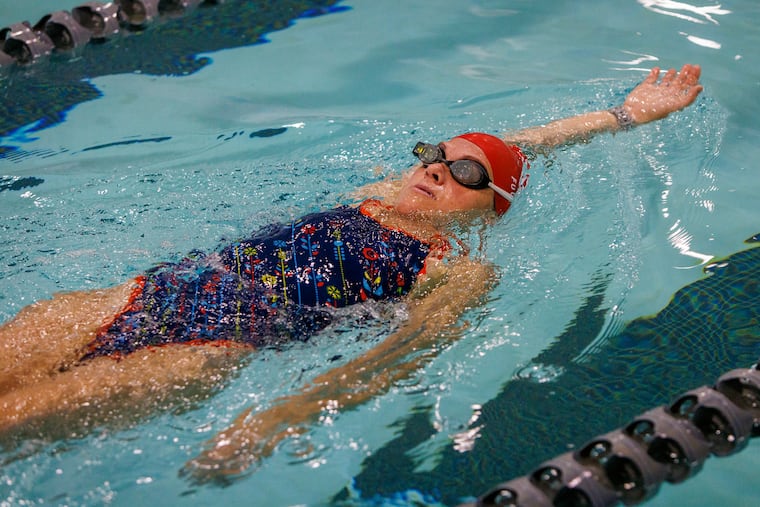Paralympic swimmer Christie Raleigh Crossley sets record, wins silver, and endures ‘bullies’
“I went from enjoying a world record to being utterly devastated," said Crossley, who suffered serious injuries in separate automobile-related incidents in the 2000s.

Toms River native Christie Raleigh Crossley set a world record and earned a silver medal amid claims of online “bullying” during what became a tumultuous debut at the Paralympics in Paris on Thursday.
Following the achievements, which came in the women’s S10 50-meter freestyle, Crossley, according to various reports, encountered comments on social media questioning her disability, including from within Team USA and from at least one competitor of another country.
Voice quivering, tears in her eyes, she addressed media after Thursday’s record-setting performance.
“I went from enjoying a world record to being utterly devastated that the entire world seems to think I was a cheater and that I was somehow faking the hole in my brain and the cyst in my spinal cord,” she said, according to the Washington Post.
The controversy surrounds the classification system that determines a para swimmer’s eligibility.
Crossley, 37, once was an All-American swimmer at Florida State before an alleged drunk driver scuttled her Division I career in 2007. She was also struck by a car as a pedestrian in a separate incident in 2008.
» READ MORE: Rowan NCAA champion swimmer had the ‘unimaginable’ happen before becoming a Paralympian
She eventually returned to the sport in 2012 and won a Division III national championship at Rowan before the brain condition that left her with several neurological deficits was discovered in 2018.
To be eligible for the Paralympics, a person must have an eligible impairment and meet the minimum impairment criteria, according to World Para Swimming, which governs classifications.
The athlete then is assigned a “sport class” in which they compete against those whose impairments similarly affect performance.
“This is done to safeguard the integrity of fair competition,” according to the World Para Athletics website.
The swimming classifications for freestyle, backstroke, and butterfly are numbered S1 through S10. S1 is considered the most impaired.
Crossley, who competes in S9 and S10 classifications, can walk short distances but often requires a wheelchair. A movement disorder causes her muscles to spasm unpredictably, especially during exercise. She often swims with one arm during training because the muscles in her left hand painfully force her fingers to curl into a fist after exertion.
During races, which generally last little more than a minute, she’ll use her left arm for as long as possible. After races, she struggles to speak. It’s as if, she says, her brain steals resources from other senses so she can race.
She also loses visual acuity during races, so helpers tap her shoulder as she approaches the wall as a cue to begin her turn.
Still, some believe she has an unfair advantage.
According to multiple reports, Sarai Gascón Moreno of Spain seemed to question Crossley’s S9 designation on social media.
Team USA para swimmer Jessica Long, who in 2020 told Sports Illustrated she couldn’t watch the sport she loved be “destroyed,” replied, “I stand with you,” to Gascon Moreno’s comment.
Gascon Moreno later posted on Instagram: “I believe that Paralympic swimming is becoming increasingly unfair. I think the classification system harms the majority of dedicated athletes who work tirelessly day after day to achieve our dreams, only to have them shattered when not all athletes in our category compete on equal terms ...”
Long, who had both legs amputated at 18 months old, is a 16-time Paralympic swimming champion. She swims in S8 and S7 classifications.
“To be told online by all of these bullies that I am not somehow disabled as I appear, just because I can swim faster than them, it’s pretty devastating,” Crossley told reporters. “Because my family witnesses my disability every day and what it takes away from our family life, what it takes away from me as a human, as a woman, and it’s been pretty awful.”
Canada’s Aurelie Rivard, who swims in S9 and S10 classes and has won five golds in four Paralympics, won bronze in Thursday’s 50 meters (27.62 seconds). Chen Yi of China took gold with an S10 world-record time of 27.10.
“I heard about what’s going on, and I hope that she is what she says she is, and I hope she deserves her place in the class and on the podium,” Rivard said, according to the Washington Post. “We have to trust our system. Hopefully, it works.”
» READ MORE: Becoming a Paralympian made this Temple rower proud of who she is
Crossley, who had brain surgery in 2019 to remove a cluster of abnormal blood cells, says she won’t stay silent about “bullying.”
She is scheduled to compete in three more events. Her next race will be Tuesday’s 100-meter backstroke S9.
“Since I’ve come into para swimming, I’ve been the subject of a lot of bullying and that was on the forefront of today,” she told reporters. “I want to be a spotlight for people who aren’t what you’d typically think a Paralympian is, but because I’m outside the norm and the cookie cutter, it’s made me a target.
“When you’re dealing with a life-changing disability, and then you think you’ve found a community and to find out there’s ableism within that, it would be very easy to just be quiet about it, but I feel like too many people have been quiet and that’s not going to be me.”